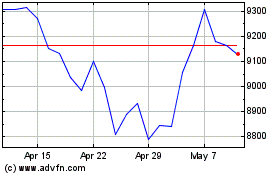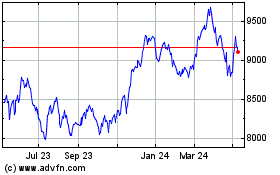After an initial wobble, financial markets mainly shrugged off
the effects of Friday's terrorist attacks in Paris, underscoring
how investors increasingly look beyond the individual atrocities
that are hitting their cities.
With investors focusing on central banks and Chinese growth,
markets, from equity to bonds and gold, were little disrupted by
the killing of at least 129 people in Paris. Financial markets have
recovered in comparable terror attacks in Madrid in 2004 and London
a year later, but the speed with which these assets regrouped on
Monday suggests investors have become more used to terror on their
own streets.
"Sadly, there's an understanding this is part of the world we
live in," said David Vickers, a senior portfolio manager at Russell
Investments, which has around $237 billion in assets under
management.
After a brief dip in early trade, the Stoxx Europe 600 was 0.3%
higher midway through the session. France's CAC 40, which fell more
than 1% in early trade, was up 0.1%.
Among traditional safe-haven investments, gold initially gained
and government bonds benefited, with the yield on German 10-year
debt 0.01 percentage point lower at 0.55%. But these moves were
seen as muted.
The negative impact on stock markets has diminished with every
major terrorist attack after the Sept. 11, 2001 attacks, including
the bombings in Madrid and London and the Boston marathon bombings
in 2013, according to research by the University of Cisneros in
Madrid.
After the Sept. 11, the New York Stock Exchange fell 7.1% on its
first day of trading and ended the week down 14%. Investors jumped
into safe haven assets such as government debt and gold, with that
metal gaining by 6.5% its first post-attack trading day.
After explosions on trains in Madrid left around 191 people dead
in 2004, Spain's IBEX35 share index closed 2.2% lower, while the
10-year German bund fell two basis points to 3.90%.
After the London bombings in July 2005, the FTSE 100 closed down
1.4% and crude prices on the New York Mercantile Exchange fell
almost 4%.
In both Madrid and London, however, markets soon recovered, and
their currencies were little affected.
Investors say reactions to terrorist attacks are increasingly
fleeting, because of their frequency and as markets conclude that
such atrocities have relatively little economic impact.
Consumer spending in the U.K. and Spain, for instance, even
climbed in the wake of the bombings in their countries, according
to Germany's Berenberg Bank.
Terrorist attacks on developing countries have also done little
to shake investors, who have now become used to such mayhem. After
two bombs killed at least 97 people outside Ankara's central rail
station in October, the Turkish BIST 100 index closed down 0.1% and
the lira edged down only 0.45% against the dollar.
Kit Juckes, a strategist at Societe Generale, remembers his
reaction to the attacks on Sept. 11.
"Then, we stood and stared, in shock," he said. "But we've moved
on (and are now) more appalled than shocked."
Investors say that the sheer scale of the Sept. 11 attacks
single them out. But they also believe that the relatively
short-lived market impact of terror attacks since 2001 means that
they were reluctant to make shifts in their portfolios on
Monday.
After a number of meetings this morning, Mr. Vickers said
investors at the firm were "coming up light" on ideas for potential
portfolio changes.
Instead, the main drivers for stock markets remain the slowing
Chinese economy coupled with anticipated shifts in eurozone and
U.S. monetary policy, he said.
Such economic fundamentals are even crowding out traditional
safe-haven flows. Gold gained 1% in London in early morning trade
but was up only 0.21% by mid-afternoon. Instead, the metal
continues to be swayed by a growing anticipation that the Federal
Reserve will raise rates this year, a move that would make gold
less competitive with yield bearing assets.
On Monday, oil also lost its early gains. Brent, the global oil
benchmark, gained 1% to $44.93 a barrel as France escalated its air
campaign against Islamic State, increasing uncertainties in the
Middle East. But by early afternoon, Brent had fallen as investors
refocused on fundamentals, in particular the effect of oversupply
in this market.
Of course, were Friday to herald a speedy escalation of attacks
in western countries, then most analysts agree the impact could be
more severe as it hits travel, government spending and consumer
confidence.
Longer terms effects from Friday's attack may come from its
impact on current debates over the structure of the European Union.
Amid security concerns, governments may begin looking at
re-erecting national boundaries, something several have already
done during the current rise of immigration into the region.
"The more problems we have related to borderless countries, the
more pressure will come for change, and that has long-term
implications for Europe," said Derek Halpenny, European Head of
Global Markets Research, Bank of Tokyo-Mitsubishi.
Neanda Salvaterra and Riva Gold also contributed to this
article.
Write to Tommy Stubbington at tommy.stubbington@wsj.com, Chiara
Albanese at chiara.albanese@wsj.com and Georgi Kantchev at
georgi.kantchev@wsj.com
Access Investor Kit for "London Stock Exchange Group Plc"
Visit
http://www.companyspotlight.com/partner?cp_code=P479&isin=GB00B0SWJX34
Subscribe to WSJ: http://online.wsj.com?mod=djnwires
(END) Dow Jones Newswires
November 16, 2015 11:15 ET (16:15 GMT)
Copyright (c) 2015 Dow Jones & Company, Inc.
London Stock Exchange (LSE:LSEG)
Historical Stock Chart
From Mar 2024 to Apr 2024

London Stock Exchange (LSE:LSEG)
Historical Stock Chart
From Apr 2023 to Apr 2024
